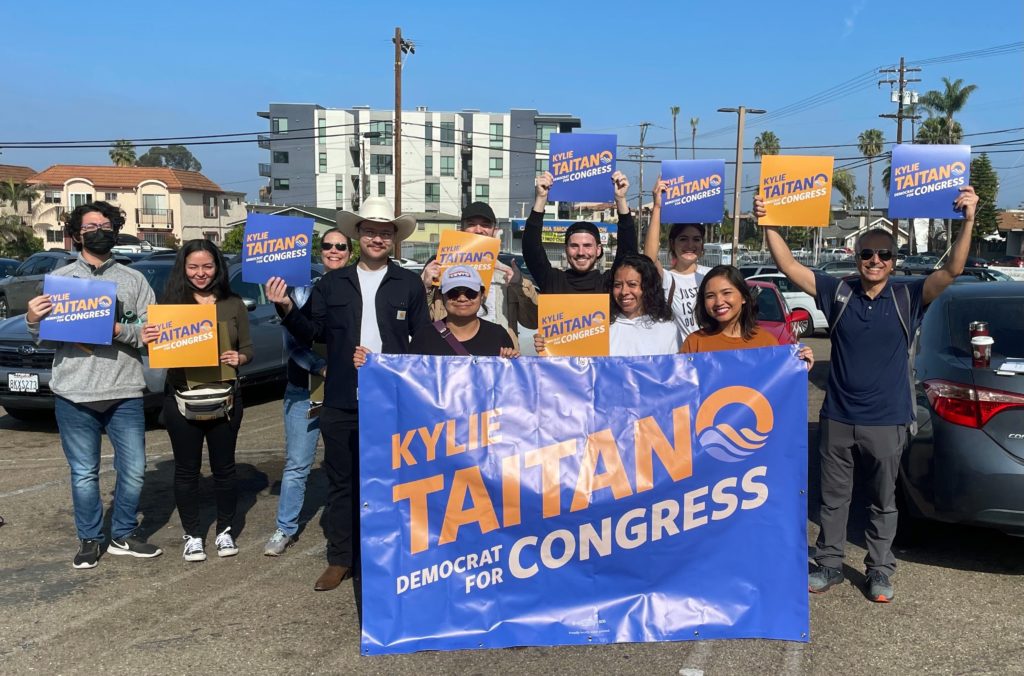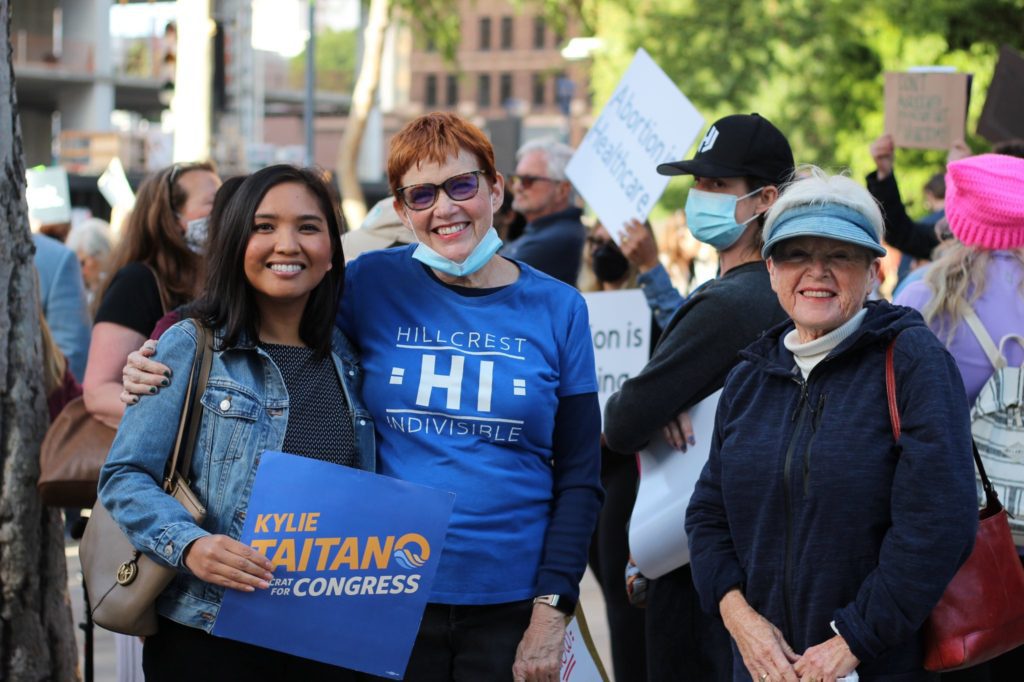EDITOR'S NOTE
Welcome to the eighth installment of The Yappie’s series featuring Asian American and Pacific Islander (AAPI) newsmakers, rising candidates, and lawmakers. If you’re interested in being featured, please email [email protected].
IN THE EARLY 2000s, when both Guam’s territorial leadership and the U.S. federal government were unpopular, entering politics was a distant concept for many people on the island.
“Growing up on Guam, all I knew was being politically disengaged and not caring about politics at all,” says Kylie Taitano. She remembers her older family members talking about the corruption in Guam’s local government, as well as their frustration with the federal government’s neglect of residents.
Now, Taitano hopes to break that cycle of apathy. Running for a seat in California’s 50th congressional district, she would be the first Filipina elected to Congress and the first CHamoru woman to serve as a full-voting federal lawmaker. A progressive, she is the only woman and the only person of color in the race.
Education, persistence, and culture
Taitano was born in northern Guam, with family in Yigo and Latte Heights. Her mother, who became a young single mom after giving birth to her as a high school student, instilled in Taitano lifelong values of education and persistence. A young Taitano would attend classes alongside her mom as she worked toward a degree in education at the University of Guam.
After several typhoons damaged Guam’s infrastructure, her family decided to move to southern California—a “quasi-immigrant experience,” Taitano says. Though she moved from a U.S. territory, she faced challenges that made her feel somewhat separated from the local community. Moving to a place where people didn’t look or speak like her was a culture shock.
She also realized early on that her unique citizenship status set certain restrictions on her ability to access and gain political capital. As someone born in Guam, Taitano is unable to run for president because she gained citizenship under the Organic Act of 1950. Considered “statutory citizens,” those born in U.S. territories are not citizens by blood or by soil and thus are barred from participating in the race for the nation’s highest office.
If the federal law were to be repealed, every person born in Guam from that point would lose their citizenship. This conversation comes up often for families from territories—and opened Taitano’s eyes to the political struggles that come with her identity.
Progressively inafa'måolek
One of Taitano’s earliest political memories involves former President Bill Clinton’s visit to Guam in November 1998, a gesture that remains a conversation point among CHamoru people. So when Hillary Clinton announced her candidacy in 2016, Taitano was excited. Not only would she have been the first woman president, but this was someone whom Taitano believed had spent time getting to know Guam.
Her choice of candidate in the 2016 election soon changed, however. While out on a date, she was asked, “Are you voting for Bernie?” To impress her date, she said yes despite not knowing who he was.
“One Google search later, I realized that the world Bernie Sanders is pushing for is the type of world we need to live in,” Taitano told The Yappie.
Upon finding out that Guam could vote in the primaries, she quickly banded together with people both in the diaspora and Sanders’ official campaign team in Guam to try to energize the vote for Sanders. She wanted people in Guam to take advantage of the opportunity, she said.
Phone-banking from California to Guam, however, she realized that Guam still struggled with voter apathy, which she said came as a surprise.
“Being a progressive totally aligns with inafa'måolek because we want our society to function altogether,” Taitano said, describing the CHamoru virtue of “inafa'måolek” as a “social currency concept” built on respect, reciprocity, and the belief that when the community prospers, the individual prospers.
“We understand that some people are more fortunate than others,” Taitano added. “People should pay their fair share of taxes so that people can prosper. I believe that inafa'måolek is one of the strongest traits I can bring to Washington. I would love to spread inafa'måolek as a political leader.”
This should doubly apply to America’s most wealthy, Taitano noted. “Millionaires and billionaires, don’t forget where you come from,” she said. “You won at capitalism, but the reason why you’re there is because your community put you there.”
“Being a progressive totally aligns with inafa'måolek because we want our society to function altogether.”
—Kylie Taitano
Serving the city she loves
When Taitano was a child living on the outskirts of San Diego, her father worked in one of the many skyscrapers that decorated the city skyline. She was often dazzled by the long elevator ride she’d take to visit him. As she looked out from the elevator window, she’d feel an overwhelming sense of belonging. That fueled her decision, at age 13, to attend college in San Diego.
She originally applied to University of California, San Diego (UCSD) to join its aerospace engineering program but chose computer science as a back-up because she loved playing video games. At the time, she had no idea UCSD’s program was one of the best in the world. She went on to become an active student in her department and in 2011 joined the founding board of the UCSD Women in Computing organization.
The nonprofit provided a safe space to recruit, retain, and advance women in computer science. It also gave them free rein to talk about the issues they face as women in tech. One of her proudest moments was fundraising $20,000 to send 20 to 25 members to the Grace Hopper Celebration of Women in Computing, the premier conference for women interested in computer science careers and research.
“My life would be vastly different if I wasn’t in tech,” she said bluntly. “I wouldn’t be talking to you if I wasn’t in tech.”
That passion extended to her 2017 founding of Code for Her, an organization that connects young girls and underrepresented minorities with women in the tech field as part of an effort to inspire more girls to join the industry. After providing in-person workshops and working closely with Girl Scouts in San Diego, the organization decided to move its curriculum online via Zoom. The expansion allowed Taitano and her colleagues to offer classes across the country and even internationally, such as in Dubai. Code for Her has also partnered with San Diego groups to provide coding and tech classes to formerly incarcerated youth.
“A lot of politicians will say they never thought they were going to run for office,” Taitano noted. “That truly was the case for me because my goal for 2022 was to start moving into software engineering management.” She was excited about the prospect of empowering people to “move forward in their careers.” The pivot was suited to her love for working with people.
But life had a different calling. Months before the Democratic primary filing deadline, the Progressive Democrats of America asked her to run for office. She had connected with the group through her work on the Sanders campaign, but was nevertheless shell-shocked. Running for office was the last thing she’d considered for herself.
“After thinking about it, [I accepted that] the opportunity to serve the city that I have been in love with since I was 11 years old would truly be the greatest honor of my life. It would be the ultimate way to give back to my community,” she said.




“My main motivation for running is because my generation is out of time,” she added, citing student debt and the costs of health care and housing. “The status quo approach that our current leadership is exhibiting—we don’t have the luxury for half-hearted compromise, incrementalism, or even blatant inaction. The effects of the climate crisis are here. We feel them in San Diego County already.”
Reaching Capitol Hill
Due to recent redistricting, California’s 50th congressional district has shifted to become more progressive. Under the new map, many people in the district have never been represented by the incumbent, Rep. Scott Peters (D).
The longtime centrist is out of touch with the district, Taitno said, especially as more people move toward progressive values. She has openly criticized him for accepting corporate funding, something she refuses to do herself. Peters has repeatedly faced accusations of taking money from Big Pharma and operating as their “paid mercenary,” according to Salon.
On the campaign trail, where she often joins volunteers to knock on doors, she says people in the community have told her she is “the full package” and that she serves a sharp contrast to Peters as a young woman of color and the only progressive in the race.
Some San Diego news outlets have called the race safe for Peters, who no longer has to appeal to more moderate and conservative voters due to the state’s new district map. He also has the backing of the establishment. But his new district comes with pressure from voters who are further left, and Taitano is banking her campaign on those voters.
When asked what strengths she would bring to Capitol Hill, the first thing she mentioned was the lessons she learned from her mother.
“You could put my mother in a steel box with no way out and she’ll find a way out,” Taitano said. “That’s how resilient my mother is. That value really stuck with me and will do me well in Congress.”
Her tech background is another plus that would give her an edge in discussing tech policy and regulation in Congress, she said—though her current company has faced recent controversy for allegedly misleading low-income customers. In her day job, she works as a software engineer at Intuit, developing and designing software programs for the company’s tax preparation platform.
Working on the software side, Taitano would not have been involved in marketing or advertisement—Intuit has since agreed to pay millions to settle a lawsuit over the claims—but she nevertheless hopes to use her subject matter experience on tech development projects to inform her policymaking.
“Tech is the next battlefield,” she said, pointing to growing forms of cybersecurity and cyber warfare. It’s also an integral aspect of life today and into the future—as the pandemic has shown. Much of the country now utilize countless remote resources that have become the default during lockdown. But many people in rural communities, especially on tribal reservations, still lack access due to poorly developed broadband infrastructure and systemic neglect. It’s an equity issue that Taitano hopes to address in Congress.
Most importantly, she wants to give back to the people of Guam. Taitano mentioned that she finds the concept of non-voting delegates—like Guam’s—ridiculous. If elected, she would gain more rights than the Guam delegate even though she was also born in the disenfranchised territory, so the best thing she can do is use her unique perspective and voice to advocate for the territories.
Asked about Guam’s political status, she told us she truly believes that the decision is in the hands of Guam’s people. This is where education is key, especially considering the fact that territorial status is a form of colonialism, she noted. “It is clear after all these years of being a territory that we do not have the same rights as others [in the continental U.S.], so I would be in favor of not having territories in this modern day and age.”
In ancient CHamoru culture, men and women both played roles in leadership. Every village had a maga’låhi, a male leader who would ensure the peace and prosperity of the village, and a maga’håga, a female leader who would guide and make decisions for the village. This ancient tradition is no longer practiced, but female leadership and strength are still woven into the fabric of CHamoru culture today—that gave her the boost she needed to take her first step toward elected office.
Her cultural background and identity serve as the backdrop for her everyday life, whether it’s food—her favorite dishes include Chicken Tinola, a Filipino chicken and vegetable soup, and åhu, a CHamoru sweet coconut soup that her nåna would have family members send from Guam—or her vision for San Diego and Congress.
“Both Filipino and CHamoru people, we are really resilient,” she said. “We are good problem-solvers, and that instilled the values in me today.”
The Yappie is your must-read briefing on AAPI power, politics, and influence, fiscally sponsored by the Asian American Journalists Association. Make a donation, subscribe, and follow us on Twitter (@theyappie). Send tips and feedback to [email protected].









